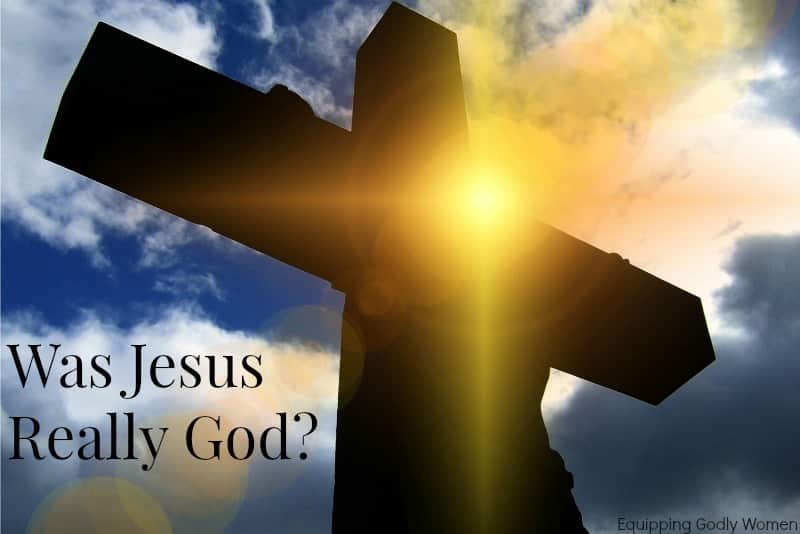The Bible: Reliable Evidence or Just a Bunch of Stories?

This is post three in a series entitled Christianity: Fact or Fiction? Examining the Evidence you Need to Know. For an overview of the series as well as links to all of the posts as they publish, just click the link! *This post contains affiliate links. Please see my disclosure policy for more information.
Is the Bible true? Well, that’s a loaded question. And the answer you get depends on who you ask.
You see, opinions vary widely. To some, the Bible is 100% truth, every word. For still others, it’s true in theory, but open to a lot of interpretation. Some see it as a definitive rule book or guide. Others see it as little more than a collection of made up stories.
So what’s the truth?
While I do believe that there are some parts that are just moral stories (such as the parables, or wisdom personified in Proverbs), the fact of the matter is, the Bible isn’t just a collection of made-up stories or fairy tales. In addition to being a divinely inspired book, it is also a very important historical document from which we can gather a TON of trustworthy, reliable and even life-changing information.
In this post, we will consider several solid pieces of evidence that let us know with certainty that the Bible writers weren’t making things up–that they were telling the truth to the best of their ability. And for the purposes of this post, we will be speaking of the New Testament only.
So… how do we know the Bible authors didn’t make the whole thing up?
1. The Bible Authors Were Eyewitnesses (Or Knew Eyewitnesses)
The Bible wasn’t written by a random and unidentified Joe Schmo off the streets who sat down to tell a story one day, like you might find with other religions. Instead, the Bible is the compilation of the writings of several authors who were right at the center of the Christian movement. People who actually walked with Jesus themselves or who were close acquaintances with those who did.
- Matthew and John were two of Jesus’s twelve disciples, which means that they would have known him personally and seen the events they wrote about firsthand.
- Mark was Peter’s disciple and interpreter, so he would have heard Peter’s firsthand account several times. (Peter was one of the 12 disciples.)
- Luke was a physician and a companion of Paul.
- Paul stayed with Cephas (Simon Peter, one of the 12 disciples) and James (Jesus’s brother) after he was converted as a result of a direct encounter with God. He went on to write much of the New Testament and plant several churches all throughout the area.
The authorship of these books is pretty widely accepted. Not only do quotes as early as 125 A.D. and church tradition verify the authorship, but no one had reason to lie about it. If someone were going to write a Gospel under a fake name (and others tried), it only makes sense that they would have chosen “stronger” names, since Matthew was a hated tax collector and Mark and Luke weren’t even apostles.
These men knew what they were talking about. They were there.
2. The Bible Was Written Early
If the Gospels had been written centuries after Jesus walked the Earth, the original, true story could have very easily expanded to an exaggerated and over-the-top legend over time. This is not the case, however.
It is widely accepted that the Gospel of Mark was written first, sometime between 60 and 75 A.D., that Matthew and Luke were written between 60 and 85 A.D., and that John was written last sometime between 65 and 95 A.D. These dates are all within 30 to 65 years of Jesus’s death and resurrection. (Compare this to other religions–whose books were “discovered” a few hundred years after the fact…)
Furthermore, the letters from Paul to the early churches were written even before the gospels, in the late 40s to 50s. That’s only 20 years after Jesus’s death and resurrection. And the creeds Paul mentions in his letters would have been formulated by the early church even before then–as early as the first couple of years after Jesus’ death and resurrection–certainly not enough time for a small group of Jewish people to make up a crazy story and get away with it!
At the time of the Gospel writings, there were still plenty of eyewitnesses around who could verify the events of the Gospels.
In fact, in 1 Corinthians 15:5-8, Paul writes out an entire list of people who saw Jesus resurrected. He even writes the phrase: “most of whom are still living,” which practically BEGS people to go check out the facts themselves. No one would provide a list of references for people to check out themselves if these people did not actually see Jesus resurrected and would not be able and willing to verify the information.
If the writers had made mistakes, someone would have said “That’s not what happened” and the story would have been squashed pretty quickly. Instead, the word was spread all throughout the land.
3. The Degree of Similarity Suggests They Were Telling the Truth
It’s no secret that there are quite a few apparent contradictions between the Gospel books. For example, Mark and Luke say Jesus healed one blind man while Matthew says he just healed one. Matthew says the women told the disciples that the tomb was empty, while Mark says the women told no one.
Yet, while many critics would see this as evidence against the Bible, the good news is that these apparent contradictions actually make a strong case FOR the Bible. If all four gospels were exactly the same, Bible scholars would conclude that the authors had conspired together to come up with a cohesive story. Instead, the inconsistencies show that each author wrote his own work independently.
And as for the differences, if you’ve ever heard two people tell the same story, you know that both versions are not going to be the exact same. They just aren’t. Each person tells their story with a different focus. And that’s all that happened here.
4. The Jews Gave Up Their Jewish Practices
For the Jews, the Old Testament laws were their entire way of life. They followed these rules strictly (and many Jews still do today) because they were convinced that their salvation depended on it (and it did). Yet, after Jesus died, hundreds of Jews gave up all or nearly all of their religious rituals. Just like that. This is no small matter.
They stopped giving animal sacrifices, they substituted Jesus’ laws for Moses’ laws and they began worshipping on Sunday instead of Saturday. They began baptizing people in the name of the Father, the Son and the Holy Spirit, which clearly elevates Jesus to the status of God. These changes would have been HUGE for first century Jews.
Imagine what it would take for you to completely abandon your religion, your family and your culture and to embrace something radical, new and different. That’s just a glimpse of what the Jewish people would have done.
5. People Experienced Radical Life Transformation
Saul, who had dedicated his life to persecuting the early Christians, changed his name to Paul, and dedicated his life to spreading the Good News instead. Jesus’ own brother, James, went from not believing in Jesus to dying a martyr’s death because of his belief. The first century Christians sold the majority of their possessions to live in community. The Bible is full of examples of people who experienced radical life change (and the same thing still happens today).
6. The Early Christians Died for Their Beliefs
Yes, plenty of people die for their religion–it still happens today. The difference here is that–the martyrs and persecuted Christians from the first century SAW the events firsthand. They knew FOR SURE whether they had happened or not. They didn’t die for something they thought was true, they died for something they KNEW was true, because they had seen it.
If it were all just a conspiracy or a lie, why would anyone continue to be a Christian and to be persecuted when they knew it wasn’t true? They wouldn’t.
7. The Bible Includes Embarrassing Details
From the women finding Jesus’ empty tomb (women were second-class citizens in those days) to Peter denying Jesus three times to Joseph of Arimathea (a member of the same council that condemned Jesus to death) giving Jesus a proper burial when his friends and family didn’t–the Bible is full of embarrassing details.
If the early Christians were making things up, they undoubtedly would have made themselves look better. They didn’t. Instead, the best reason why they would have passed on these embarrassing facts is because they are true.
8. Outside Sources Confirm Key Details
The Bible may be the best source we have in regards to Christianity, but it certainly isn’t the only one. As I mentioned in last week’s post, Jesus: Historical Figure or Modern Fairy Tale? additional sources outside the Bible also verify the most important facts as well. You can click back to read that evidence if you missed it the last time.
Whether you believe the Bible is the divinely inspired word of God or not, there simply is no denying that it is an incredibly valuable historical document as well. And while you could try to find ways to explain away everything it say (and many people do), honestly, the best and simplest solution is simply that it’s true.
*This post contains affiliate links, which means if you make a purchase, I may make a small commission at no additional cost to you. Thank you!
Resources
Fascinated and ready to learn more? Here are a few great resources that will help you do just that.
The Case for Christ by Lee Strobel
The Case for the Real Jesus by Lee Strobel
Did Jesus Exist: The Historical Argument for Jesus of Nazareth by Bart D. Ehrman







Nice article. Some can hear the message and just have faith but there are some of us who first heard the message scratched our heads and said i want proof!!!thanks for sharing!!!!
That’s how I am too, Jillian. I know faith is great and all, but I really like to know the proofs behind things too. I don’t like blindly trusting things for no reason (and I don’t think we need to).
Great examples. Love the article.
Thanks, Lissa!
Nope what about the Old testament(The Genesis mostly), immaculate conception, Noah’s boat, calling Jesus son of David if Joseph wasn’t his biological father, I need explanations
Those are some very big questions! Basically, for me, what it comes down to is this: Is God real or not? Because if there is no God – then those things are impossible. But if God is real (and I 100% believe He is), then none of those things are too difficult for Him. He created the entire world out of nothing. Surely He can also create the baby Jesus without a father or call the animals into the ark, right? 🙂
If God is real – then it only makes sense that we would have miracles throughout history that point to that.
Does that help at all?
That is not the Immaculate Conception. The Immaculate Conception refers to the Conception of the Most Blessed Virgin Mary.
Yes, that is correct 🙂
If god does not exist then how do you expect live to be so complex, is it by a miracle as you say. Does not sound that smart we all have a creator. No fighting just talking ok? I am confused because in school there teaching me evolution and I was raised a christian and now have so much doubts and am lost. Can you help me think again why is god real and how do you believe this?